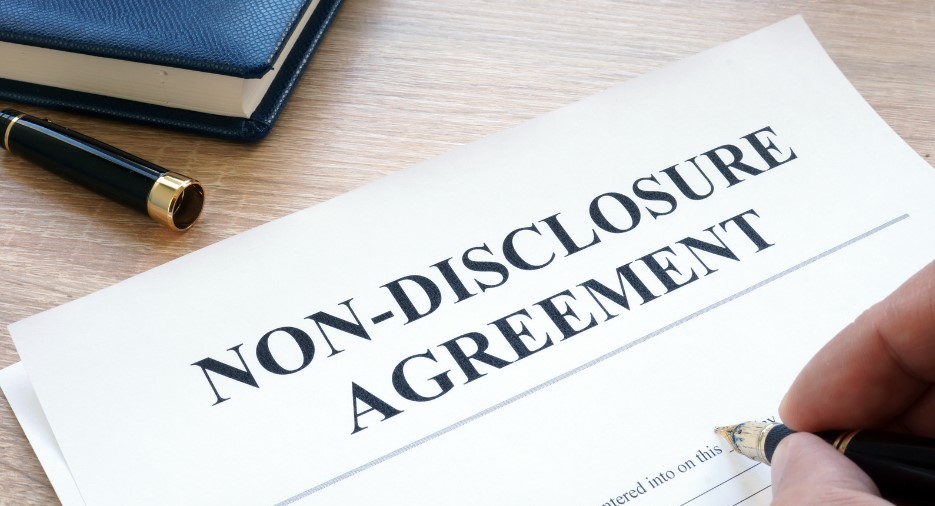Breaking a non-disclosure agreement (NDA) can have severe consequences, and it’s essential to understand the repercussions before taking any actions. Whether you’re revealing confidential information or breaching the terms of the agreement, the legal implications of violating an NDA can be significant.
So, what exactly happens if you break an NDA? Are there legal penalties? Financial repercussions? And can you go to jail for violating an NDA? The answers to these questions may surprise you.
In this article, we will explore the consequences of breaking an NDA, the potential penalties for disclosing NDA information, and the legal repercussions for breach of contract. We will also shed light on common misconceptions and provide insights into when and how an NDA can be broken.
Whether you’ve signed an NDA in the workplace, are curious about celebrity NDAs, or want to understand the implications of infringing NDA terms, this article will provide you with valuable information. Stay tuned to discover what happens if you break an NDA and gain crucial insights into this complex legal territory.
Employment NDA Agreement Violations
Violating an NDA in the workplace can have serious consequences for employees. Disclosing confidential information covered by an employment NDA can result in legal action from the employer, including financial penalties and even termination of employment.
An employee who breaches their confidentiality agreement by sharing sensitive information at work may face severe repercussions. The employer may take legal action to protect their business interests and hold the employee accountable for their actions.
Confidentiality agreements are an essential aspect of protecting sensitive information within a professional setting. Breaching these agreements can undermine trust, damage professional relationships, and potentially harm the employer’s business.
Penalties for violating an employment NDA can include financial liability, such as having to pay damages, as well as reputational damage. Additionally, disclosing confidential information may result in the loss of employment, as employers prioritize safeguarding their trade secrets and proprietary information.
Consequences of Employment NDA Violations
The repercussions for breaking an employee NDA can be severe and may vary depending on the specific terms outlined in the agreement. The consequences can include:
- Financial penalties: Employees who breach their NDA may be required to compensate the employer for any financial losses incurred due to the disclosure of confidential information.
- Termination of employment: Employers have the right to terminate the employment of individuals who violate NDAs, as such breaches are considered serious misconduct.
In addition to these direct consequences, employees who breach confidentiality agreements may also face potential legal action and damage to their professional reputation.
It is crucial for employees to understand and adhere to the terms of their employment NDA agreements. By respecting confidentiality and avoiding the disclosure of sensitive information, employees can help maintain trust, protect their employers’ interests, and avoid the negative consequences associated with breaching employment NDAs.
“Confidentiality is crucial in the workplace, and violating an employment NDA can have lasting repercussions for both employees and employers. It is vital for all parties involved to take these agreements seriously and honor their commitment to safeguarding confidential information.”

| Consequences of Employment NDA Violations | Penalties |
|---|---|
| Financial liability | Employees may be required to pay damages to compensate for financial losses caused by the breach of an employment NDA. |
| Termination of employment | Employers have the right to terminate the employment of individuals who violate NDAs, as such breaches are considered serious misconduct. |
| Legal action | Employees who breach their employment NDAs may face potential legal action and the associated costs. |
| Reputational damage | Disclosing confidential information can harm an employee’s professional reputation and future job prospects. |
Breach of NDA Penalties and Consequences
When it comes to breaching a Non-Disclosure Agreement (NDA), the penalties and consequences can be significant. The specific terms outlined in the agreement will determine the severity of these repercussions. In general, violating an NDA can result in legal action, financial liabilities, and potential damage to one’s reputation.
If a party breaks an NDA, the affected party has the right to pursue legal action. This may involve filing a lawsuit to seek remedies for the breach. The breaching party can face monetary fines, be held liable for financial damages caused by the breach, and may even face criminal charges in extreme cases.
Defending against NDA breach claims can be challenging. It is essential to consult with legal professionals to understand the potential legal liabilities and build a strong defense. The breaching party may be required to pay legal fees, damages, and may experience reputational harm as a result of the breach.
Financial Damages for NDA Violation
One of the consequences of breaking an NDA is the potential financial damages that the breaching party may be required to pay. Financial damages aim to compensate the affected party for any losses suffered as a result of the breach. These damages can include lost profits, loss of business opportunities, and the cost of legal fees incurred to address the breach.
The specific amount of financial damages will depend on various factors, such as the extent of the breach and the impact it had on the affected party. Courts consider the actual financial losses experienced by the affected party and may also consider punitive damages to discourage future breaches.
Defending Against NDA Breach Claims
When faced with NDA breach claims, the breaching party must mount a strong defense. Defenses against NDA breach claims may include disputing the validity of the NDA itself, arguing that there was no actual breach or that the terms of the NDA were ambiguous and therefore unclear.
Additionally, the breaching party may argue that the information disclosed was already publicly known or that the NDA was unconscionable, meaning that its terms were unfair or oppressive. The success of these defenses will depend on the specific circumstances surrounding the breach and the applicable laws in the jurisdiction.
It is crucial to seek legal counsel when defending against NDA breach claims. An experienced lawyer can evaluate the situation, provide guidance on the available defenses, and help navigate the legal process.
How to Get Out of an NDA?
Getting out of an NDA can be challenging, but there are certain steps that can be taken. It is important to assess whether the NDA is legally binding and if there are any termination clauses or exceptions that may apply. Consulting with a lawyer can help evaluate the situation and determine the best course of action. If there are legal grounds to challenge the NDA, it may be possible to nullify or terminate the agreement.
When trying to get out of an NDA, it is crucial to carefully review the terms and conditions stated in the agreement. Look for any clauses that allow for termination or exceptions that may exempt certain disclosures. Some NDAs may have specific provisions for ending the agreement or circumstances where disclosure is permitted.
In order to legally challenge an NDA, it is essential to gather evidence and build a strong case. Document any instances where the other party may have breached the NDA or where you believe the agreement is unenforceable. This evidence will be crucial when presenting your case to a lawyer or in court, if necessary.
An experienced lawyer specializing in contract law can provide invaluable guidance in navigating the process of terminating an NDA. They can help analyze the validity of the agreement and identify any legal loopholes or defenses that may be available to you.
It’s important to note that challenging an NDA can be a complex legal matter, and outcomes may vary depending on the specifics of your situation. It’s always advisable to seek legal advice tailored to your individual circumstances.

What Should You Include in an NDA?
When creating a non-disclosure agreement (NDA), it is important to include specific elements to ensure its effectiveness and enforceability. By including vital information and key elements, you can draft a strong NDA that protects your confidential information. Here are some necessary clauses to consider:
- Specify the time frame: Clearly define the duration of the NDA, whether it is for a specific period or indefinitely. This sets the boundaries for the agreement.
- Describe the confidential information: Provide a detailed description of the information that is considered confidential. This can include trade secrets, proprietary data, client lists, or any other sensitive information. Be as specific as possible to avoid ambiguity.
- Identify the parties involved: Clearly state the names or entities of all parties involved in the NDA. This ensures that both parties understand their obligations and rights.
- Explain the purpose of the NDA: Clearly articulate why the NDA is being implemented. This can include protecting competitive advantage, maintaining confidentiality during business partnerships, or safeguarding intellectual property.
- Outline consequences for breaches: It is crucial to specify the repercussions for breaching the NDA. This can include financial penalties, injunctions, or even legal action. Clearly communicate these consequences to deter potential breaches.
Drafting a legally enforceable NDA requires careful consideration of these elements. Seek legal advice to ensure your NDA is comprehensive, specific, and protective of your confidential information.

Investigating NDA Breaches
When an NDA breach is suspected, companies typically launch a formal investigation. This involves gathering evidence for nda violation to determine which information was leaked, who leaked it, and whether a breach has occurred. The investigation is usually carried out by legal and HR teams handling nda investigations, who work together to ensure a thorough examination of the situation.
One of the crucial steps in investigating nda breaches is reviewing nda contracts. The legal team thoroughly examines the terms of the NDA to identify any potential violations and assess the severity of the breach. They analyze the specific provisions that may have been violated, such as the scope of confidentiality, duration of the agreement, and consequences for disclosure.
Furthermore, gathering evidence for nda violation is essential during the investigation process. This may involve collecting documents, communications, or any other relevant information that supports the claim of an NDA breach. The HR team often plays a significant role in this aspect by interviewing employees and witnesses to gather firsthand accounts, establish a timeline, and identify any parties involved in the breach.
“Accusing someone of breaking an NDA is a serious matter that requires a thorough investigation.”
Once all the necessary evidence is gathered and reviewed, the legal and HR teams collaborate to identify parties involved in nda breach. This may include employees, contractors, or any other individuals who had access to the confidential information covered by the NDA. By identifying the parties involved, the company can take appropriate action to address the breach and mitigate any potential damage.
The investigation process for NDA breaches should be conducted with the utmost professionalism and confidentiality. It is crucial to respect the privacy and rights of all parties involved while diligently seeking the truth. By following a systematic approach to investigating nda breaches, companies can effectively address the violation and take appropriate legal measures to protect their confidential information.
| Key Steps in Investigating NDA Breaches |
|---|
| Launch a formal investigation |
| Review the NDA contracts |
| Gather evidence for nda violation |
| Identify parties involved in nda breach |
| Address the breach and mitigate the damage |
Legal Actions for NDA Breach
When a breach of a non-disclosure agreement (NDA) has been investigated and proven, legal actions may be pursued to address the violation adequately. The specific legal actions taken will depend on the outcome of the investigation and the circumstances surrounding the breach. Here are some common legal actions that may be pursued:
1. Pursuing Legal Claims for NDA Violation
If sufficient evidence is found to prove the breach of an NDA, the affected party has the option to pursue legal claims against the breaching party. This involves filing a lawsuit to seek compensation for the damages incurred as a result of the breach. The claim will typically outline the specific violations of the NDA and the resulting harm caused, such as financial losses or damage to reputation.
2. Seeking Damages for NDA Breach
One of the main objectives in pursuing legal actions for an NDA breach is to seek financial damages to compensate for the losses suffered. Damages may include not only the direct financial losses but also any indirect or consequential damages caused by the breach. This can help the affected party recover their losses and mitigate the negative impact of the breach on their business.
3. Obtaining Injunctions for NDA Violations
In some cases, the affected party may seek an injunction to prevent further disclosure or use of the confidential information covered by the NDA. An injunction is a court order that prohibits a party from performing certain actions. In the context of an NDA breach, an injunction can be sought to restrain the breaching party from further disseminating or utilizing the protected information. This can be crucial in preventing the potential harm that may arise from continued disclosure.
4. Court Proceedings for NDA Breaches
Resolving an NDA breach may require court proceedings to reach a final resolution. This typically involves presenting the evidence of the breach in court and allowing both parties to present their arguments and defenses. The court will assess the evidence and make a judgment based on the merits of the case. The judgment may include orders for damages, injunctions, or any other appropriate remedies to address the breach and protect the interests of the affected party.
It’s important to consult with legal professionals experienced in intellectual property and contract law to navigate the legal actions for an NDA breach effectively. Their expertise can help ensure the best possible outcome for the affected party and protect their rights and interests.
Conclusion
Breaking an NDA after signing it can have serious consequences, including financial liability and legal action. However, there may be options available based on the specific circumstances. It is essential to seek legal advice and carefully consider the potential risks before deciding how to proceed after breaching an NDA.
One potential option after breaching an NDA is to explore whistleblower protections. In certain cases, individuals who disclose information in the public interest may be protected by law. However, it’s important to understand the specific requirements and limitations of these protections.
Another consideration is that time limits on confidentiality restrictions can expire. Depending on the terms of the NDA, there may be a duration after which the information can be openly shared without legal consequences. It is crucial to consult a legal professional to properly interpret the NDA and determine if it still applies.
In conclusion, if you find yourself in a situation where you have breached an NDA, it is crucial to seek legal advice to understand the options available to you. Whistleblower protections and expiration of confidentiality restrictions may provide some avenues, but it’s important to navigate these situations with caution and within the boundaries of the law.




